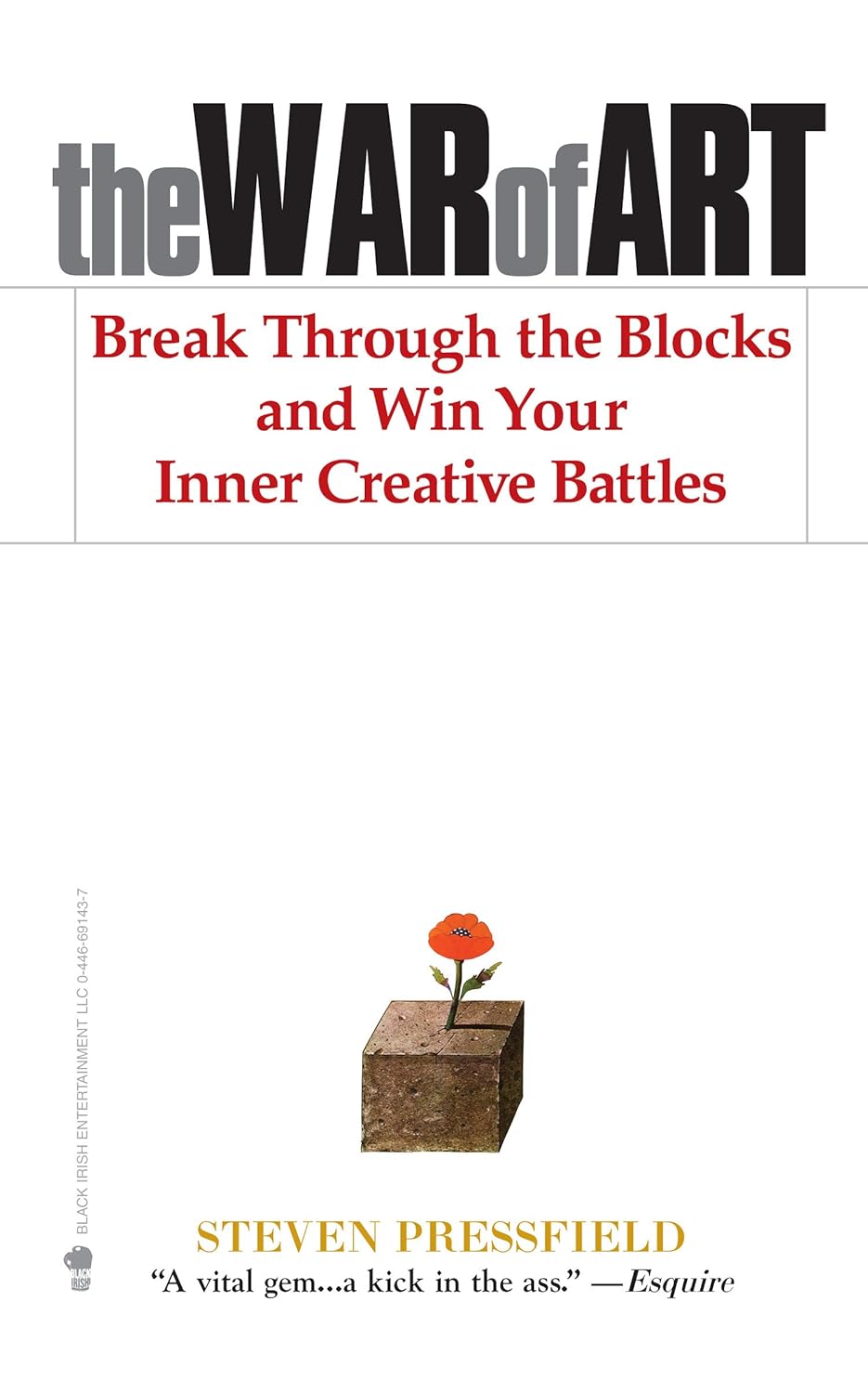 Book Review: The War of Art, by Steven Pressfield (Black Irish Entertainment, 2002)
Book Review: The War of Art, by Steven Pressfield (Black Irish Entertainment, 2002)
“The counterfeit innovator is wildly self-confident. The real one is scared to death.” (p.39)
No wonder I spend half my time eating, in front of the television – it’s because I’m the real deal. Scared to death. This book by Steven Pressfield, author of The Legend of Bagger Vance, The Virtues of War and other bestselling novels, is succinct and truly helpful. He identifies the enemy of all creativity – in fact of all authentic endeavor – as Resistance, and then proceeds to wage war against it. A former Marine, Pressfield is an action-oriented, non-coddling kind of guy, and it shows in this work. His antidote to the age-old problem faced by all creative people is a show of force, will. His no nonsense manifesto on how to take down Resistance is as demanding and motivating as a pre-game high-volume speech from the coach in the locker room. It gets you all hyped up and believing YOU CAN DO THIS. There is value in that hope and the new plan.
He calls this knuckling down “going pro.” You don’t let Resistance win. It is edifying to read his view of what makes you turn the corner and “go pro.” Going pro is just a decision you make, whenever you start treating your work professionally. And like any profession, you therefore take on the attitudes of the workplace toward your writing:
- You show up, every day
- You work your “office hours”
- You work when it’s inconvenient, when you’re sick and when your kid’s home from school
- You’re committed over the long haul
- The stake are high and real
- You work for money
- You do not over-identify with your job
- You learn and master continuously
- You have a sense of humor about your job
- You allow your work out in the real world – where it honestly judged and valued
“The professional knows that fear can never be overcome. He knows there is no such thing as a fearless warrior or a dread-free artist.” (p.79)
It is inspiring to read about someone who can conquer the Resistance we all feel, and sit down and write. Simple as that. There are great aspects of this book, and I was inspired by the concept of “going pro.” There is strength in the idea of just working. Regularly. And there’s power in the separation of the ego from the work. It is harder to finish – much less sell – work that you feel is “you.” The ways this might show up? If it’s “you” then it has to be perfect. If it’s “you” you can’t risk real input/criticism; If it’s “you” you can’t collaborate creatively. If it’s “you” it’s held up in hope and fear. and how can you ever let it go? As soon as it becomes the work, you are freer, more creative, and more empowered to bring it into the world effectively. And it becomes not about you and your fears, but something you’re creating for your readers.
It becomes “the work” by taking a truly professional attitude toward the work. You begin to separate your ego from the outcome or the output. You stop wondering if you’re good enough, because guess what? You can never know that about yourself. You can just work for its own sake, share because you have the courage and drive to share, and then let the world decide.
On the other hand, Pressfield is yet another advocate for “white knuckling” it. His refrain is: Force yourself. Stick to a routine – no excuses. He likens it to bootcamp: learn how to be miserable.
For me, there is only so far willpower can take me, and then my Inner Rebel starts taking hostages. I don’t believe in force when undertaking a diet, trying to write a novel or learning to ride a bike. We all try force, first, it’s the easiest way. Even when we parent, we try force first. “Because I said so.” But we all know too well that raising your voice, demanding, and shaming stops working on children, and Inner Children – where are best creativity comes from.
A great and constant work ethic can come from choice and the joy and delight of the endeavor. It doesn’t have to include a gun to your head. Clearly this is a method that worked for Pressfield as he pulled his life out disarray and began to work, religiously. And it could work for many, many others. It is one method of getting down to work, that is well articulated and easy and inspiring to read.
Just one word of warning: if this method doesn’t work for you, it doesn’t mean you’re not a real writer or a pro. It might just mean you need a gentler approach to your inner writer. If willpower isn’t getting your pages done, then you just might need to look at when and why the Resistance roars up and learn how to live with it. Learn how to lessen it. In Pressfield’s war analogy – you can befriend the enemy.